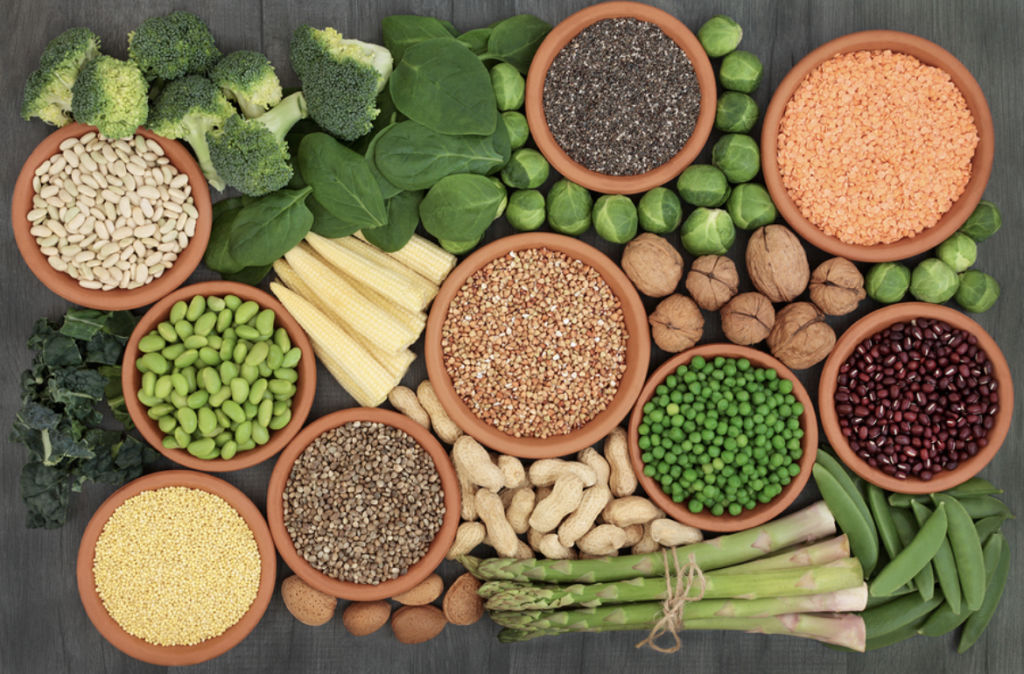While experts can argue about the harm or benefit of fats and carbs, caffeine and wine, wild fish vs. farmed fish, or the pros and cons of GMOs, one thing is clear: everyone agrees that protein is important and beneficial.
Unfortunately, many people following a vegetarian or vegan diet don’t get the daily protein they need. But with just a little effort, it can be done. It takes paying attention to your protein intake and a little planning—but other than that, it’s not hard to do!
Here are some foods you can easily find and incorporate into your diet, and why it’s so important to do so…
Why protein is so important for your body
Look through this list of benefits and you’ll agree that protein does some critically important things for your body!
- Reduces appetite and hunger
- Helps maintain weight loss
- Increases muscle mass and strength
- Helps build strong bones
- Reduces cravings and snacking
- Helps your body repair itself after injury
- Boosts metabolism and increases fat burning
- Lowers blood pressure
- Helps you stay fit as you age
That’s a pretty impressive list—protein is important! If you’re vegan or vegetarian, you definitely need to make the effort to make sure you’re getting of it in your daily diet.
13 Foods to add protein to a vegan or vegetarian diet
1) Protein-rich fruits and vegetables
All fruits and vegetables contain protein, but some contain more than others. Vegetables with the most protein include broccoli, spinach, asparagus, artichokes, potatoes, sweet potatoes, sweet corn, and Brussels sprouts.
Fruits generally have lower protein content than vegetables, but those containing the most protein include guava, mulberries, blackberries, nectarines, and bananas.
2) Seitan
This is a meat alternative made from wheat gluten. You can find it in the refrigerated section of many grocery stores, or you can easily make your own. You can pan-fry, sauté, or grill seitan. It’s a popular meat substitute because of its high protein content, meat-like texture, and versatility.
3) Tofu, tempeh and edamame
These are all products of soybeans, and soybeans are an excellent source of protein. Edamame can be eaten on its own or added to soups or salads. Tofu doesn’t have much taste but absorbs the flavor of what ingredients it’s cooked with. And tempeh is pressed into a patty and has a nutty flavor. All three are good sources of protein, among other nutrients.
4) Lentils
Lentils are super foods. They are rich in protein and other nutrients.
5) Beans
High amounts of protein are found in kidney beans, black beans, pinto beans, and chickpeas (also known as garbanzo beans).
6) Green peas
A cup of cooked green peas has slightly more protein than a cup of milk, along with other important nutrients.
7) Quinoa
Quinoa can be prepared and eaten similarly to rice and is a complete source of protein.
8) Ezekiel bread—and other breads made from sprouted grains
Ezekiel bread is made from sprouted whole grains and legumes. Two slices of Ezekiel bread contain slightly more protein than regular bread.
9) Soymilk
Soymilk is made from soybeans. It’s a great alternative to cow’s milk and a good protein source.
10) Oats and oatmeal
Oats are an easy way to add protein to your diet. Besides oatmeal, you can use oats in a variety of recipes, and they also make good veggie burgers.
11) Wild rice
Wild rice contains approximately 1.5 times as much protein as other long-grain rice varieties.
12) Chia seeds, hempseed, flaxseeds, and other seeds
Sprinkle these in your smoothies, baked goods, or salad dressings for a good source of protein.
13) Nuts and nut butters
When choosing nut butters (peanut butter, almond butter, cashew butter, etc.), try to get natural nut butters to avoid the oil, sugar, and salt often added.
5 Foods you can add to the list if you’re vegetarian
In addition to the foods already listed, you can add the following If you’re a vegetarian instead of vegan.
1) Greek yogurt
Greek yogurt is a delicious addition to smoothies, great with fruit and granola as a parfait, and often used as a sour cream substitute. It’s loaded with protein.
2) Cottage Cheese
Also loaded with protein, cottage cheese is delicious with fruit, as a veggie dip, or just by itself.
3) Eggs
Don’t just eat the whites! The yolks are also protein and nutrient-rich.
4) Milk
Pour milk over your fortified breakfast cereal for a meal high in protein.
5) Cheese
While you don’t want to overdo it on cheese, enjoy some slices with sliced apples or pears, or on crackers. Delicious!
Plan for protein
A common problem with vegan or vegetarian diets is that they frequently lack sufficient protein. It’s not hard to get enough protein in your diet, but it does take some awareness and planning.
Bottom line: vegan and vegetarian diets are a healthy way to eat, as long as you’re consuming the right foods and getting that all-important protein!

